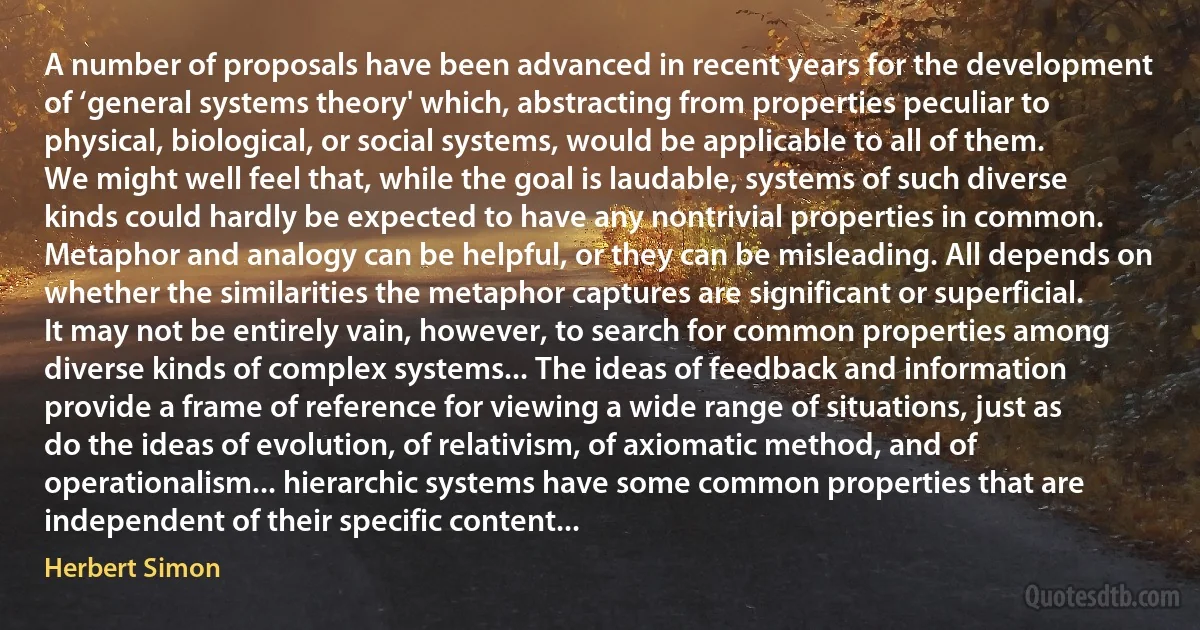
A number of proposals have been advanced in recent years for the development of ‘general systems theory' which, abstracting from properties peculiar to physical, biological, or social systems, would be applicable to all of them. We might well feel that, while the goal is laudable, systems of such diverse kinds could hardly be expected to have any nontrivial properties in common. Metaphor and analogy can be helpful, or they can be misleading. All depends on whether the similarities the metaphor captures are significant or superficial. It may not be entirely vain, however, to search for common properties among diverse kinds of complex systems... The ideas of feedback and information provide a frame of reference for viewing a wide range of situations, just as do the ideas of evolution, of relativism, of axiomatic method, and of operationalism... hierarchic systems have some common properties that are independent of their specific content...
Herbert SimonRelated topics
biological common complex content development evolution frame general might metaphor number search significant specific superficial vain viewing well while wide feedback years relativismRelated quotes
Look at England, whose mighty power is now felt, and for centuries has been felt, all around the world. It is worthy of special remark, that precisely those parts of that proud island which have received the largest and most diversified populations, are to day the parts most distinguished for industry, enterprise, invention and general enlightenment. In Wales, and in the Highlands of Scotland the boast is made of their pure blood, and that they were never conquered, but no man can contemplate them without wishing they had been conquered. They are far in the rear of every other part of the English realm in all the comforts and conveniences of life, as well as in mental and physical development. Neither law nor learning descends to us from the mountains of Wales or from the Highlands of Scotland. The ancient Briton, whom Julius Caesar would not have as a slave, is not to be compared with the round, burly, amplitudinous Englishman in many of his qualities of desirable manhood.

Frederick Douglass
Indeed, over the years I have had many a good laugh at the pompous moralism and blatant dishonesty of India's so-called secularists. Their specialty is to justify double standards, e. g. why mentioning murdered Kashmiri Pandits is "communal hate-mongering” while the endless litany about murdered Gujarati Muslims is "secular consciousness-raising”. Sometimes they merely stonewall inconvenient information, such as when they tried to deny and suppress the historical data about the forcible replacement of a Rama temple in Ayodhya by a mosque: given the strength of the evidence, all they could do was to drown out any serious debate with screams and swearwords. But often they do bring out their specific talents at sophistry, such as when they argue that a Common Civil Code, a defining element of all secular states, is a Hindu communalist notion, while the preservation of the divinely-revealed Shari'a for the Muslims is secular. That's when they are at their best.

Koenraad Elst
[T]he evidence from anthropology concurs with history in refuting the popular belief in a Jewish race descended from the biblical tribe. From the anthropologist's point of view, two groups of facts militate against this belief: the wide diversity of Jews with regard to physical characteristics, and their similarity to the Gentile population amidst whom they live. Both are reflected in the statistics about bodily height, cranial index, blood-groups, hair and eye colour, etc. Whichever of these anthropological criteria is taken as an indicator, it shows a greater similarity between Jews and their Gentile host-nation than between Jews living in different countries. ...The obvious biological explanation for both phenomena is miscegenation, which took different forms in different historical situations: intermarriage, large-scale proselytizing, rape as a constant (legalized or tolerated) accompaniment of war and pogrom.

Arthur Koestler
The theories that I (and others) helped develop explained why unfettered markets often not only do not lead to social justice, but do not even produce efficient outcomes. Interestingly, there has been no intellectual challenge to the refutation of Adam Smith's invisible hand: individuals and firms, in the pursuit of their self-interest, are not necessarily, or in general, led as if by an invisible hand, to economic efficiency. The only question that has been raised concerns the ability of government to remedy the deficiencies of the market. Within academia, a significant fraction of economists are involved with developing and expanding on the ideas of imperfect information (and imperfect markets) that I explored. For instance, Edmund Phelps, this year's Nobel Prize winner, belongs to this "school" of thought. But in political discourse, simplistic "market fundamentalism” continues to exert enormous influence.

Joseph Stiglitz
Philosophers of science have repeatedly demonstrated that more than one theoretical construction can always be placed upon a given collection of data. History of science indicates that, particularly in the early developmental stages of a new paradigm, it is not even very difficult to invent such alternates. But that invention of alternates is just what scientists seldom undertake except during the pre-paradigm stage of their science's development and at very special occasions during its subsequent evolution. So long as the tools a paradigm supplies continue to prove capable of solving the problems it defines, science moves fastest and penetrates most deeply through confident employment of those tools. The reason is clear. As in manufacture so in science-retooling is an extravagance to be reserved for the occasion that demands it. The significance of crises is the indication they provide that an occasion for retooling has arrived.

Thomas Samuel Kuhn
